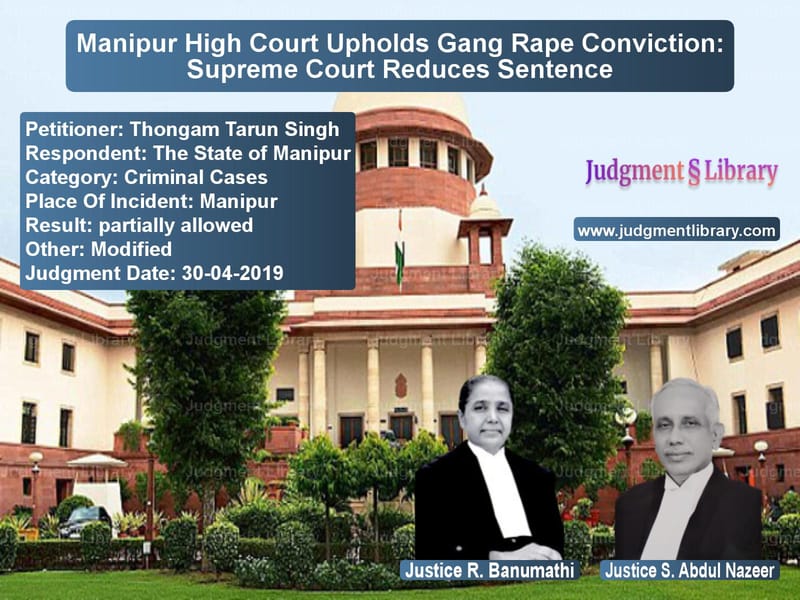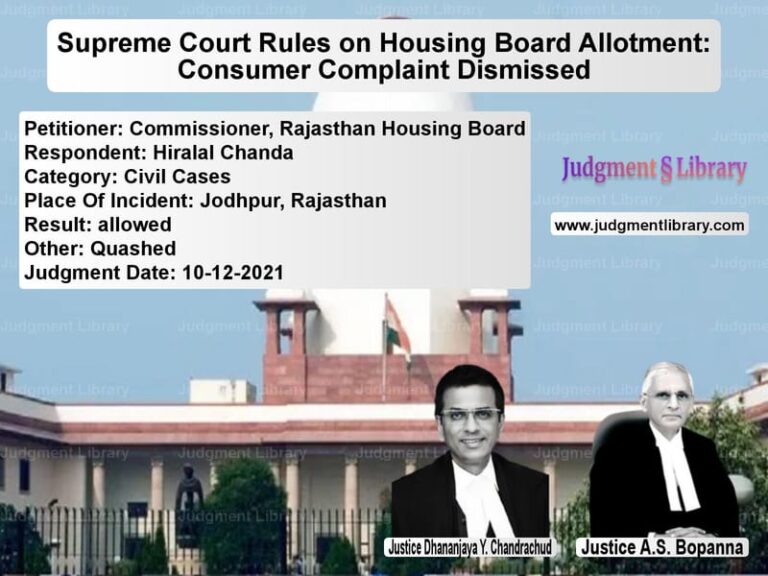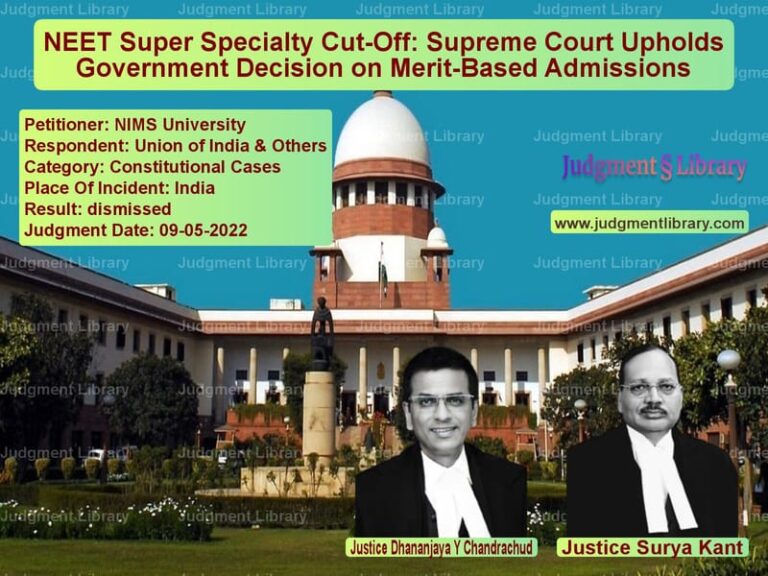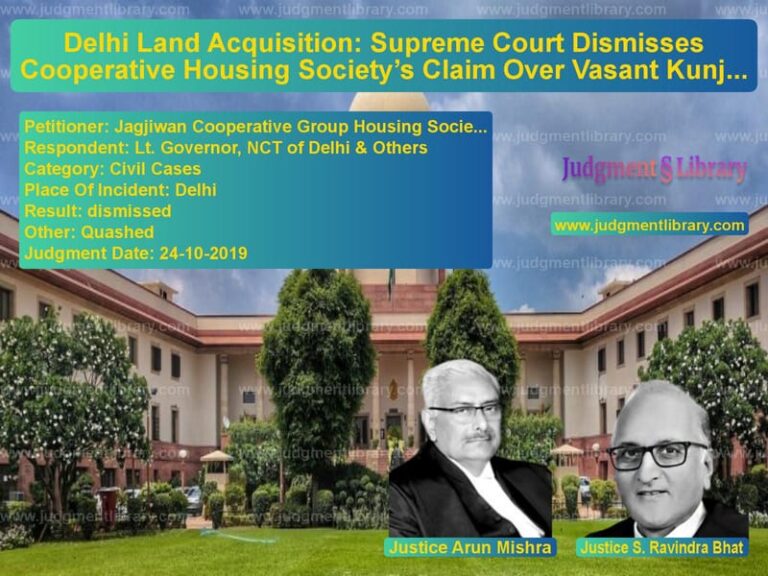Manipur High Court Upholds Gang Rape Conviction: Supreme Court Reduces Sentence
The Supreme Court of India recently delivered a judgment in the case of Thongam Tarun Singh vs. The State of Manipur, addressing the conviction and sentencing of two appellants in a gang rape case. The appeals stemmed from the judgment passed by the High Court of Manipur, which had affirmed the conviction of the appellants under Section 376(2)(g) IPC and Section 120-B IPC for committing gang rape. The appellants were sentenced to rigorous imprisonment for fifteen years with a fine of Rs. 25,000 each. Additionally, they were sentenced to ten years of rigorous imprisonment under Section 120-B IPC, with the sentences running concurrently.
Background of the Case
The prosecution’s case stated that on 20th October 2012, the victim, a 16-year-old girl, was picked up by the appellants and taken to a restaurant in a Maruti car. The victim was allegedly given a soft drink mixed with an intoxicant, which rendered her unconscious. She was then subjected to rape by both appellants. Upon regaining consciousness, she found herself in a compromised state. The next day, her mother lodged a complaint, leading to the registration of an FIR under Sections 376 IPC and 120-B IPC. Following the investigation, a charge sheet was filed against the appellants, and they were charged accordingly.
Trial and Conviction
The trial court relied on the victim’s testimony, medical evidence, and corroborating witness statements, convicting both appellants under Section 376(2)(g) IPC for gang rape and Section 120-B IPC for conspiracy. The High Court subsequently upheld the trial court’s decision, leading to an appeal before the Supreme Court.
Key Arguments by the Appellants
- The defense argued that the appellants were not specifically charged under Section 376(2)(g) IPC during the trial, making their conviction under this section legally flawed.
- The appellants’ counsel contended that without a specific charge framed under Section 376(2)(g), the trial court should not have convicted them under this section.
- The appellants also claimed that the victim’s testimony was inconsistent and unreliable.
Key Arguments by the State
- The prosecution emphasized that the victim’s testimony, medical evidence, and the sequence of events clearly established the offense.
- The respondent’s counsel referred to Section 464 Cr.P.C., arguing that a conviction should not be deemed invalid merely due to the absence of a specific charge, provided no miscarriage of justice occurred.
- It was highlighted that the evidence overwhelmingly proved that the victim was subjected to rape by both appellants, satisfying the legal definition of gang rape.
Supreme Court’s Observations
The Supreme Court, while acknowledging the arguments, held that:
- Despite the absence of a specific charge under Section 376(2)(g) IPC, the facts and evidence presented sufficiently established the offense.
- “Considering the evidence of PW-5 and other evidences, in our considered view, even though no charge was framed under Section 376(2)(g) IPC, the conviction of the appellants under Section 376(2)(g) IPC cannot be faulted.”
- The court further ruled that the conviction did not cause any serious prejudice to the appellants.
Reduction of Sentence
Although the Supreme Court upheld the conviction, it examined whether there were special circumstances warranting a reduction in the sentence. It considered:
- The appellants’ age at the time of the offense (24-25 years).
- The fact that one appellant was a police driver and the other was a reputable singer.
- Their good conduct in jail, as evidenced by certificates from the prison authorities.
- The absence of previous criminal records.
Taking these factors into account, the court reduced the sentence:
- The original sentence of 15 years rigorous imprisonment under Section 376(2)(g) IPC was reduced to 8 years.
- The sentence of 10 years under Section 120-B IPC was also reduced to 8 years.
- Both sentences were ordered to run concurrently.
Final Judgment
The Supreme Court partially allowed the appeal, reducing the sentence but maintaining the conviction. The judgment reinforces the principle that failure to frame a specific charge does not automatically invalidate a conviction if the evidence supports the charge. However, it also acknowledges mitigating factors in sentencing.
Legal Implications
The ruling clarifies important aspects of procedural law and sentencing:
- It reaffirms that courts can convict under a provision even if the charge was not specifically framed, provided no miscarriage of justice occurs.
- It highlights that sentencing must consider individual circumstances, including conduct, social background, and rehabilitation potential.
Conclusion
This case underscores the importance of judicial discretion in sentencing while ensuring that procedural lapses do not override substantive justice. The Supreme Court’s decision balances the need for strict enforcement of laws on sexual offenses with considerations of fairness in sentencing.
Petitioner Name: Thongam Tarun Singh.Respondent Name: The State of Manipur.Judgment By: Justice R. Banumathi, Justice S. Abdul Nazeer.Place Of Incident: Manipur.Judgment Date: 30-04-2019.
Don’t miss out on the full details! Download the complete judgment in PDF format below and gain valuable insights instantly!
Download Judgment: Thongam Tarun Singh vs The State of Manipur Supreme Court of India Judgment Dated 30-04-2019.pdf
Direct Downlaod Judgment: Direct downlaod this Judgment
See all petitions in Rape Cases
See all petitions in Bail and Anticipatory Bail
See all petitions in Judgment by R. Banumathi
See all petitions in Judgment by S. Abdul Nazeer
See all petitions in partially allowed
See all petitions in Modified
See all petitions in supreme court of India judgments April 2019
See all petitions in 2019 judgments
See all posts in Criminal Cases Category
See all allowed petitions in Criminal Cases Category
See all Dismissed petitions in Criminal Cases Category
See all partially allowed petitions in Criminal Cases Category







